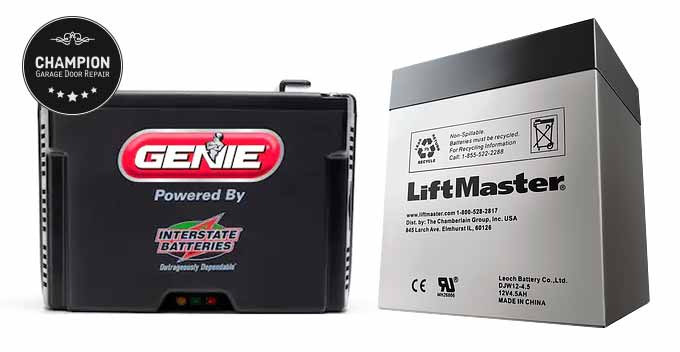As of July 1, 2019, California Section 19892 mandates that all garage door openers sold and installed in the state must have a battery backup. The California garage door law aims to ensure residents can evacuate during emergencies, with a $1,000 civil penalty for violations.
Section 19892 – Garage Door Openers with Battery Backup
Senate Bill 969, approved by the California Governor on September 21, 2018, became law under Section 19892 of the California Health and Safety Code (HSC). The law mandates that no individual, garage door repair company, contractor, or entity can manufacture, sell, install, or offer for sale a residential garage door opener in California without including a designated battery backup system.
This also implies that entities and retailers outside of California are prohibited from selling residential garage door openers without a designated battery backup in the state. The code specifies that any electric opener installed or replaced in California must have the capability to function with its own backup power source during a power surge.
Why California Garage Door Opener Law Came into Effect
Senate Bill 969 came into existence in response to the wildfires that occurred in October 2017, which ravaged over 245,000 acres, destroyed 8,900 structures, and tragically claimed 43 lives in Los Angeles and California. Senator Bill Dodd, who was responsible for the legislative proposition, emphasized its importance, stating, “Ensuring we have battery backups for residential automatic garage door systems is a small step that can save lives.”

The fires resulted in power outages, tragically leading to loss of life for some residents who were unable to evacuate in time. The situation exacerbated as some individuals were unfamiliar with the emergency release function of their garage doors, and in some cases, the garage door was too heavy for them to open manually.
During one of the fires, Dodd faced this situation while evacuating his Napa home. It was reported that the senator “could not open his heavy wooden garage door”. The senator mentioned that one of his neighbors was forced to drive through his garage door to flee, and commented on the matter: “With the looming threat of more wildfires, we must do everything possible to keep people safe. Requiring backup batteries on garage door openers will save lives and ensure no one is left vulnerable.”
The Senator has acknowledged that garage doors can be disconnected from their opener and operated manually; however, this is not always practical for individuals with certain medical conditions and physical limitations. For instance, seniors and people with disabilities may face difficulties in reaching the garage door’s manual levers and opening the door manually.
The California battery backup law proposal passed the Assembly, winning by 53 to 6 on the vote. The bill was signed into law by California Governor Jerry Brown, who was commended for his dedication to safeguarding California residents during turbulent circumstances. The Consumer Federation of California and garage door manufacturers, including LiftMaster, Chamberlain, and Genie, also supported California SB 969.
Potential Problems with Senate Bill 969 and Section 19892
The California garage door opener law wasn’t passed without its critics. According to DASMA, battery backups are not life-safety equipment. Their statement notes, “Garage door openers with backup batteries are not designed to serve as life safety devices. Battery backup systems require regular maintenance and must be regularly tested and periodically replaced.” Then adding a critic from a garage door dealer: “Whatever the logic is behind the decision, it is poor, but I’m not surprised, after all, this is California.”
Scott O’Neill, a garage door repair technician from Madden Door argued that Senate Bill 969 could lead people into a false sense of security, saying that the law “defeats the safety of knowledge” since residents may become too reliant on their battery backup and not bother learning how to manually open their garage door in the case that their power is out and their battery backup fails.
Another potential issue is that homeowners, even those not residing in fire-prone areas, now incur significant costs collectively to buy openers with advanced safety features like a battery backup. This includes ongoing expenses for maintaining and replacing the battery.
Garage Door Repair Costs and Section 19892
The California garage door law adds to the already high living costs in the state, forcing residents pay more for garage door repairs or new installations. Only garage door openers powered by DC motors are compatible with battery backup systems. Although DC motors have advantages, they are more complex and expensive to manufacture and repair compared to the standard induction AC motor.
Consumers can expect spending an additional $200-$300 when installing their garage doors and openers. Coupled with the increased maintenance and repair costs for DC openers, this will make life even more challenging for those already living on the poverty line.
Final Thoughts
The 2019 garage door opener law mandates that all residents, property owners, garage door repair companies, contractors, and home builders in California must use garage door openers with a designated battery backup when installing or replacing them. Although this requirement increases the cost of garage door openers, the enhanced safety introduced by Senate Bill 969 could potentially save lives in the future. Nevertheless, residents should still learn how to operate their garage doors manually in case a backup battery fails at an inconvenient time.
California Garage Door Opener Law Q&A
- What is Senate Bill 969? Senate Bill 969 was a proposal that became California law and took effect on July 1, 2019. The law mandates that all garage door openers in residential settings must be equipped with a battery backup system as standard.
- Why was this bill introduced? In the 2017 California wildfires, at least 5 people were killed when they became trapped inside their own garages and couldn’t escape due to power cuts which stopped their garage door openers systems from working.
- Do you need to get a new garage door opener? You will need to buy a door opener with a battery backup only if you’re going to replace your garage door opener.
- Can you still repair and get parts for your existing non-battery backup door opener? Yes, you can still purchase parts for non-compliant door openers from the manufacturer and can repair an existing garage door opener, however, if the motor needs to be replaced entirely, then you will need to purchase a new garage door opener with battery backup.
- What happens if you sell or install a non-battery backup garage door opener in California? You will be fined $1,000 for each opener. This includes garage door openers which were sold and purchased outside of California.
- What about non-motorized garage doors? Non-motorized doors do not have to be replaced with automatic garage doors, assuming that they are functional manually.
- How long does a battery backup last? Typically, you can expect a battery to last around 2 years with normal use. This duration might be extended if you disconnect the battery when the door is unplugged for an extended period, such as during vacations or prolonged absences from your home. Your garage door opener should signal when the battery is depleted, and it is your legal responsibility to replace the battery backup promptly.
- How long does the garage door battery last without power? The battery can operate the garage door approximately up to 10 times without being charged.
- Why is the battery backup only available on DC garage door opener units? Batteries supply DC (Direct Current) electricity, meaning they are only compatible with garage door openers which run on DC. For this reason, garage door openers that are powered by AC motors are illegal in California.
- How to operate the garage door manually? Pull the red lever hanging from the garage door opener’s rail. Learn more about using the garage door manually.
- How to test your opener battery backup? Unplug the opener from the outlet and press the wall button or remote to open and close your garage door. Learn more about garage door safety testing.
- How to replace depleted backup battery? Unplug the opener from the outlet and remove the battery cover. Use needle-nose pliers to disconnect the electrical wires. Pull out the depleted battery, then insert the new one and reconnect it. Let it charge for a couple of hours and then test it. Contact a licensed garage door repair company for assistance.









Good to know that you should have a backup battery checked every once in a while. I would think that would be a good way to make sure that it is still working. I’ll have to consider getting a new battery for mine since it has been quite a while since I had it changed.
So right now I’m stuck having to pay for this expensive back up. It’s for stupid people. Who does not know how to to release the damn garage door. It’s pretty simple. Why don’t you just have a teaching program to show stupid people how to use it! Now I’m stuck paying for something I don’t need. I know how to get out of my garage without electricity. You should pay those of us who are on a fixed budget who have knownfor YEARS how to get the garage door open.
Can I get repair parts for my 25 year old garage door motor shipped to CA